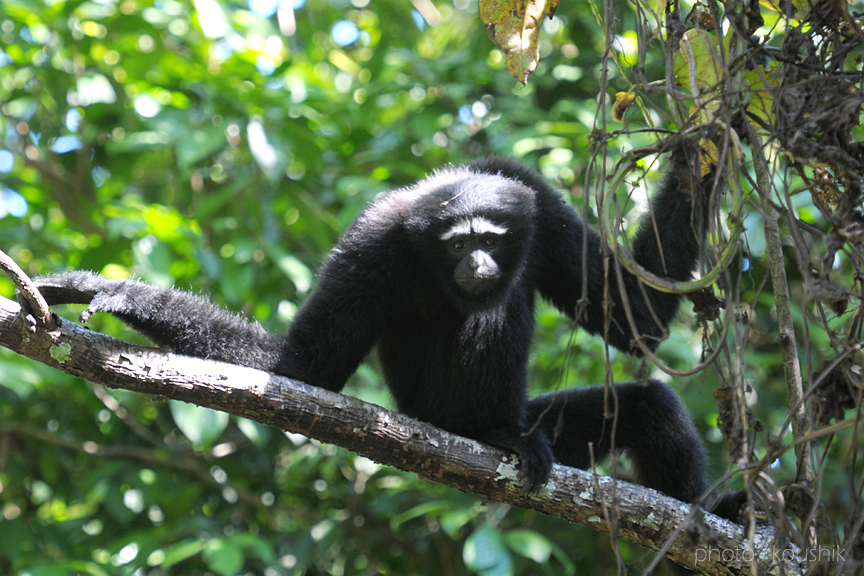Western Hoolock gibbons in India

Learning more about Hoolock gibbons and the threats they face.
Funding for this project has now finished
The problem
Less than 500 Western Hoolock gibbons are thought to remain in Bangladesh, so protecting the remaining Indian population is extremely important.
The Western Hoolock gibbon is an endangered lesser ape found in Asia. Unfortunately this charismatic species is facing habitat loss and hunting across its range. Those found in Assam represents more than 70% of the Indian population. To ensure the long-term conservation of the gibbons in this region, ten priority forest complexes have been identified.
Despite the fact that these forests have huge conservation scope, they are facing enormous anthropogenic pressures. The forestry department in the region has inadequate infrastructure and capacity which means that there is weak protection for wildlife within the forests. Poor awareness and ignorance of the needs of endangered species, such as these gibbons, among the local communities leads to negative attitudes towards conservation and consequently a hostile relationship with the forestry department.
The solution
Extending the work of our past project to protect Western Hoolock gibbons, it is critically important to improve the infrastructure of the department. Our team on the ground need to ensure that the frontline forest staff have the tools and help that they need. This will enable them to raise awareness within the local communities and persuade them to play a participatory role in conserving the Western Hoolock gibbons.
Thirty forest staff will be trained in how to effectively and efficiently monitor wildlife. They will be given proper equipment – field kits, boots, torches, leech guards, raincoats, batteries and GPS units. These items are not only essential for the men to carry out their work properly but they help boost morale and build a sense of pride in their work. Being dressed properly and having the right gear also means they will be respected by the local community.
The forest rangers will not only monitor the Western Hoolock gibbons, but they will also report on any poaching activities that they come across and be given the means to reduce illegal activities. By visiting, educating and working with the local communities it is hoped that the team will be able to change the attitudes of communities towards wildlife and conservation so that attempts to poach wildlife will be significantly reduced.
Successes so far
Our 2015 project led by by the Primate Research Centre Northeastern India studied three forest complexes in the Karli Anglong district of Assam. It achieved its objectives of understanding the habitat, population status and threats for this species, revealing that:
- The estimated population in the area is 140 groups and 392 individuals, constituting over 65 percent of the total population in Assam
- Habitat destruction in the form of jhoom cultivation and illegal logging presented the greatest threat to the Hoolock in this region
- Hunting in the area negatively affects population size.
- The team also undertook a training and educational programme, training 67 front line forest staff in wildlife monitoring and management techniques, as well as a 20 day schools programme educating 1383 participants and organising 5 community-level education programmes.
You can read published action plan and the final report our first Western Hoolock gibbon project here.
Thank you to all our donors who helped us fund this work. You can help us support more projects like this with a donation today:

